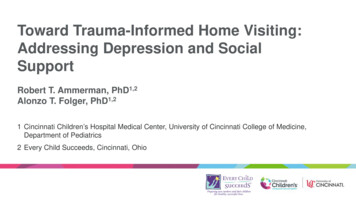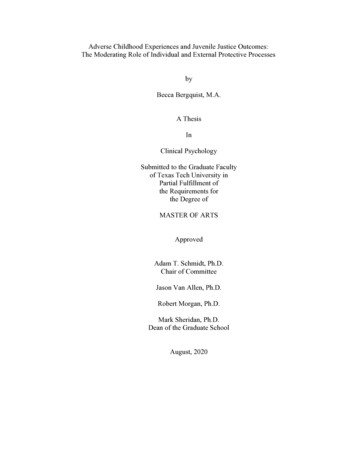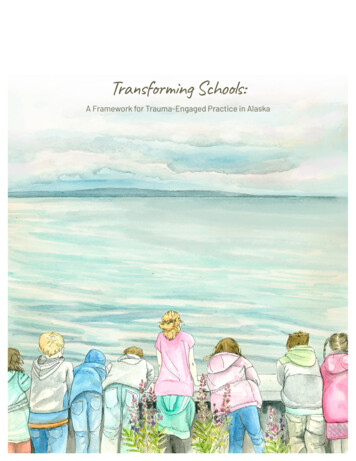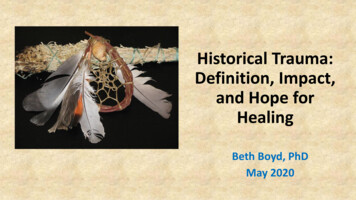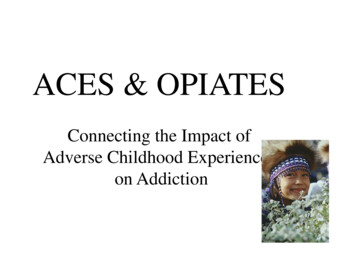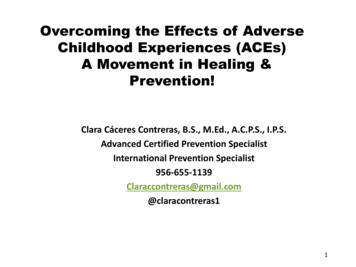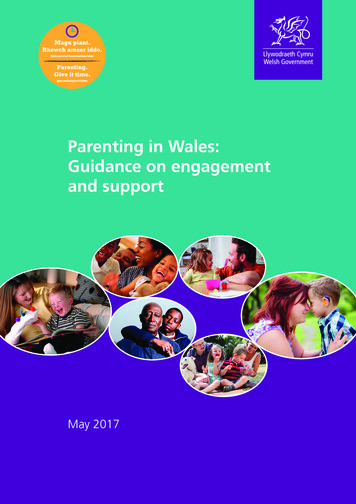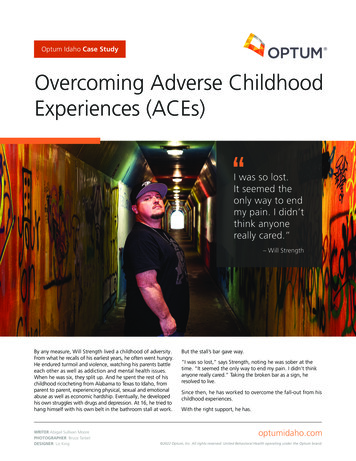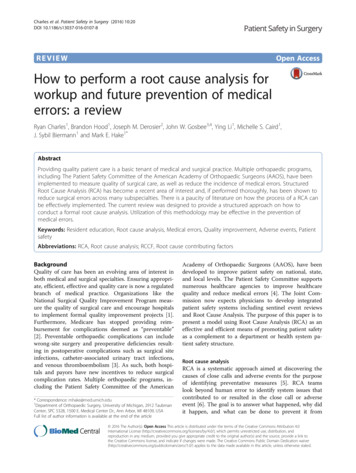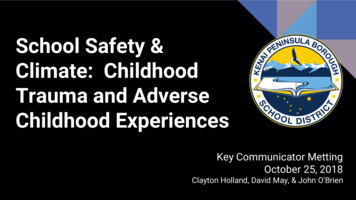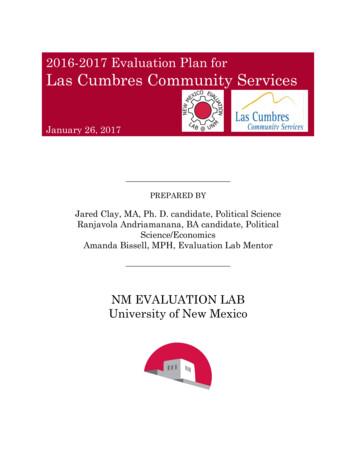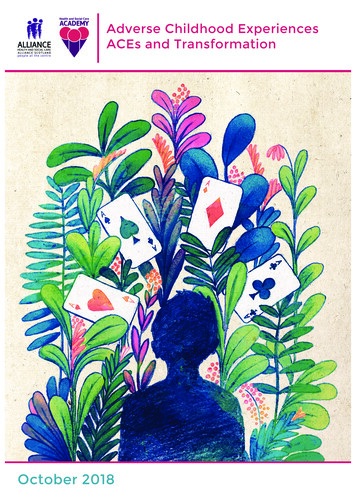
Transcription
Adverse Childhood ExperiencesACEs and TransformationOctober 2018
IntroductionThe Health and Social Care Academy (theAcademy), a programme of the Health andSocial Care Alliance Scotland, gives a voice tothe experiences and concerns of disabled people,people living with long term conditions andunpaid carers. The programme encourages andsupports innovative approaches that will createsignificant and positive changes in health andsocial care in Scotland.In 2015, the Academy brought people togetherfrom across Scotland to discuss how we cantransform health and social care to make surethat everyone thrives. Five themes emergedfrom these discussions which we call our ‘FiveProvocations’1.One of the Provocations, ‘emphasising humanity’,encourages health and social care systems tovalue the people at the centre of their work.Emphasising humanity recognises that focussingsolely on diagnosis and treatment can divertattention from what truly helps us flourish in ourcommunities and as individuals.This paper explores the research surroundingadverse childhood experiences (ACEs), andScotland’s response to this concept. Developingan informed approach to ACEs has the potentialto radically transform health and social care inScotland. The following pages identify some of thechallenges and opportunities that Scotland willencounter on this journey.1 tions/1
ACEs and Toxic StressAdverse childhood experiences, or ACEs, areharmful events that negatively impact a child’smental, physical, or emotional wellbeing. ACEsinclude childhood experiences of abuse or neglect,as well as exposure to household dysfunction suchas parental imprisonment or domestic abuse.Partly, this increase in risk is due to the greaterlikelihood that as adults they will participate inbehaviours that may impact their health suchas excessive or repeated use of alcohol or otherdrugs. For some, these behaviours becomecoping mechanisms to manage the physical andemotional impact of childhood trauma. In Walesfor example, research found that adults whoexperienced higher levels of adversity in childhoodwere six times more likely to smoke.3 Somestudies have theorised that this increase may bedue to the calming neurological effect of nicotine.4While some level of stress is essential for healthydevelopment, excessive intensity or frequency ofthese harmful events activates a child’s stressresponse too often. Without sufficient supportfrom an adult, prolonged exposure to highlevels of the hormones activated by stress, suchas epinephrine or cortisol, can derail, or evenfundamentally alter, the development of a child’sbrain and body.2.People who don’t engage in behaviour that couldnegatively impact their health still have a greaterchance of developing a range of health conditionsif they experienced childhood adversity. Findingssuggest that this increase in risk is the result ofrepeated exposure to toxic stress in childhood.5Continual exposure to a high level of stress isoften referred to as ‘toxic stress’, in part dueto its hazardous effect on health and the areasof the brain critical for learning and behaviourmanagement.Behavioural and social research suggeststhat higher levels of resilience can be found inchildren who have at least one positive and stablerelationship with an adult. These relationshipscan act as a barrier against the effects of trauma,helping to mitigate its impact on brain and bodydevelopment. Stable and positive relationshipswith adults play an essential role in helpingchildren to develop key skills such as monitoringand regulating behaviour.6Over the last two decades, studies throughout theworld have identified that adults who experienceACEs, and as a result toxic stress, are at a muchgreater risk of developing a range of healthconditions including depression, heart disease,and diabetes.2 E%20&%20Resilience%20Report%20(Eng final2).pdf3 E%20&%20Resilience%20Report%20(Eng final2).pdf4 0017-8/pdf5 ocial-care-inscotland/6 ilience1.pdf2
The First ACE StudyIn the late 1980s, Vincent Felitti, head of KaiserPermanente’s Department of PreventativeMedicine in San Diego7, became concerned thatthe dropout rate of participants at Kaiser’s obesityclinic was approximately 50%. Investigatingfurther, he discovered that many of the peoplehe interviewed who had left the programmehad experienced childhood sexual abuse. Theinterviews indicated to Felitti that these peoplemay be gaining weight because of their childhoodexperiences.8Joining with Robert Anda from the Centers forDisease Control and Prevention (CDC), theysurveyed over 17,000 patients from 1995 to1997 to discover how childhood trauma impactedhealth and wellbeing.This pioneering study examined 10 adversechildhood experiences prevalent in researchliterature and suggested by almost 300 Kaisermembers to be the most common.The 10 ACE Categories from the Kaiser Study:Many of the participants in the first ACE study were white, middle class, college educated, and hadaccess to good quality health care. Even so, over 50% of survey respondents had experienced at leastone ACE during their childhood indicating that ACEs are very common in society.97 Kaiser Permanente is one of America’s leading health care providers. The Kaiser Permanente Centre for Health Researchwas founded in 1964 and performs public health research within large, diverse populations. https://research.kpchr.org/About8 n-obesity-clinic/9 https://acestoohigh.com/aces-101/3
ACEs in ScotlandResearchIn 2016, the Scottish Public Health Network produced ‘Polishing the Diamonds - Addressing AdverseExperiences’10 which summarised the research and set out areas for action in Scotland. This led tothe establishment of a Scottish Multi-disciplinary ACE Hub. The membership of the Hub includesrepresentation from Health, Police, Social Work, Third Sector, academics and the Scottish Government.It is involved in action to: Raise awareness of and understanding about ACEs Contribute to developing the ACE evidence base Explore and share policy and practice approachesto prevent ACEs and mitigate their negativeimpacts. NHS Health Scotland and other members of the ACE Hub have established links with colleagues inPublic Health Wales11, England and in Northern Ireland to share approaches including on research andpolicy and in a variety of settings including primary care, education, police and housing.10 /2016 05 26-ACE-Report-Final-AF.pdf11 ACE focussed work is rapidly progressing in Wales with the first ACE study for Wales occurring in 2015. An ACE SupportHub has been developed by a voluntary collaboration of organisations, including Public Health Wales, called Cymru WellWales. The ACE Support Hub seeks to support individuals and communities to make the changes that will establish Walesas a leader in tackling and preventing ACEs. http://www.wales.nhs.uk/sitesplus/888/page/878354
PolicyThe Scottish Government set out its commitment to preventing and mitigating ACEs within theprogramme for Government 2017-1812. This commitment is focussed on preventing ACEs andsupporting the resilience of children and adults in overcoming early life adversity across all areas ofpublic service. This builds on the Getting it Right For Every Child (GIRFEC) approach13. In March 2018,the Deputy First Minister, John Swinney hosted an ACEs event at Bellahouston Academy attendedby cabinet members including the First Minister14. Following this, the Scottish Government createda dedicated web page for ACEs15 and asked people to continue the national discussion, providecomments and feedback directly to them, or use other networks including social media16. The ScottishGovernment has also published a summary of evidence on links between childhood adversity andcriminality in adulthood17.PracticeNHS Health Scotland launched an animationin May 2018 to provide an insight into ACEs inScotland and how to respond to early adversity18.This can be found along with other relevantinformation on ACEs in Scotland on the NHSHealth Scotland website19.open to anyone with an interest in ACEs and hasover 3,000 members.The documentary ‘Resilience: The Biology ofStress and the Science of Hope’23 follows theprogress in America from the initial discoveriesabout the links between the number of adversechildhood experiences surveyed in an adultpopulation and health. It covers the challengesin generating action to address this public healthdiscovery and how these findings are now beingacted upon across America.NHS Education for Scotland produced a TraumaTraining Framework20 which is aimed at thewhole workforce. The Scottish Governmentwill be investing an additional 1.35 million todevelop a national training strategy to supportits implementation. NHS Education for Scotlandhas also produced an animation which aims toincrease understanding in the workforce abouttrauma21.The film premiered in Glasgow in April 2017 andlaunched a Scottish wide tour of the film led byConnectedBaby24 and ReAttachment25. In 2018,a number of organisations arranged furtherscreenings throughout Scotland, including theALLIANCE and NHS Health Scotland.Alongside the Scottish Multi-disciplinary ACEshub, several regional and national groups havebeen established. The ACEs Scotland Forum22 is12 http://www.gov.scot/Publications/2017/09/846813 tingitright/what-is-girfec14 od-experiences-aces-ministerial-event/15 od-experiences/16 For example, on Twitter using #ScotlandACEs17 hildhood-adversity-resilience-crime/18 w-ofaces#Animation19 hildren/adverse-childhood-experiences20 ogy/nationaltrauma-training-framework.aspx21 https://vimeo.com/27470369322 https://twitter.com/acesscotland23 https://kpjrfilms.co/resilience/24 http://connectedbaby.net/25 http://reattachparenting.co.uk/5
What could make ACEs transformational? Integrate routine ACE inquiry into existinghealthcare assessments. Routine screeningswill provide healthcare professionals with moreopportunities to deliver personalised traumainformed care and support for adults with highACE scores. An ACE informed approach shouldbe used to support and empower healthcareprofessionals to shift the conversation fromone of treatment, “what’s wrong?”, to one ofexperience and wellbeing “what happened?”. The effects of adversity in childhood canreverberate in many areas of adult life. ACEsrequires a cross-sectoral, whole life approachto ensure Scotland’s public bodies can developshared and transparent goals. Only by workingtogether and learning from the experiences ofadults with ACEs can significant and positivechanges occur in health and social care. A national ACE study should be produced inScotland to understand the prevalence of ACEsin Scotland. Furthermore, research and factfinding should be undertaken to evaluate whatworks well in helping to mitigate the impact ofACEs and toxic stress. This information shouldbe used to support greater understandingon how data, resources and services can betransformed to support people who haveexperienced adversity. Increase investment and support for parentsand families to help break the inter-generationalcycle of ACEs. More guidance and support for adults who haveexperienced childhood adversity. Strategies andpractical steps should be readily available forpeople and communities. Recognising that people do not always need orwant a healthcare solution or quick fix regardingACEs. In some circumstances, acknowledgementand appreciation that childhood experiences canaffect later life is of great value. 6
What could stop ACEs from beingtransformational? Not recognising that the ACE score is meant asa guideline and should not be considered a newlabel to attach to people. ACE research shouldbe viewed as the beginning of a journey whichwill help people, families and communities torecognise trauma and lead to personalised careand support. Third sector organisations, public bodies, andthe Scottish Government lacking time andpatience to work toward long-term goals andsupport colleagues to tolerate the uncertaintyregarding the future impact of ACE relatedpolicy. ACEs not being seen within the wider contextof tackling societal inequalities. Childhoodadversity can occur in every community andin every walk of life. Focussing entirely ondeprivation in relation to ACEs may limitthe possibilities to create significant positivechanges. 7
Emphasising humanity, valuesand flourishingIn recent years, ACE research has beeninstrumental in highlighting the prevalence ofadverse experiences in childhood. In England andWales, almost 50% of participants in ACE studieshave experienced at least one ACE. Althoughsimilar research has not yet been undertaken,it wouldn’t be unreasonable to assume similarlevels in Scotland26.to develop interventions and services that betterrespond to the requirements and rights of peopleand communities.If a significant number of residents in Scotlandexperience trauma and adversity early in theirdevelopment, it demands a substantial andpositive change in current approaches to healthand social care.If utilised effectively, an understanding aboutchildhood adversity provides the spark fororganisations to reflect and improve theirworking patterns in the search for greateralignment. As organisations speak and work morecollaboratively, ACEs could become the platformwhich allows the education, justice, housing,employment, planning, transport and health andsocial care sectors to embed a person centredapproach throughout Scotland.It’s increasingly hard to deny that an ACEinformed approach has the potential to transformhealth and social care in Scotland. With research,routine screenings, and investment in parentaland family support, a person’s ACE score maybecome the first step on a pathway to holistic andpersonalised care. This would allow organisationsACEs research can empower those who feel thatthe trauma they experienced as children had asignificant impact on their adult lives. The comfortand the empathy ACE awareness encourages incommunities, families and people should not beunderestimated as a significant and beneficialchange in health and social care.26 /2016 05 26-ACE-Report-Final-AF.pdf8
Advice and support with traumatic eventsNHS Inform provides a list of organisations that offer specialist advice and support. You can access thisinformation at -traumatic-eventsFor more on ACEs why not visit: NHS Health Scotland: hildren/adversechildhood-experiences Scottish Public Health Network, Report on Addressing Adverse Childhood Experiences (ACEs)in Scotland: s/2016/06/ACE Repor Final 2016.pdf CDC Website: dex.html Dr Nadine Burke Harris, How childhood trauma affects health across a lifetime, TEDMED 2014,https://www.ted.com/talks/nadine burke harris how childhood trauma affects health across alifetime ACEs Too High: https://acestoohigh.com/ ACEs Scotland Forum: https://twitter.com/acesscotland ACEs Scotland Facebook: https://www.facebook.com/groups/446224005750444 Scottish Government ACEs Factsheet: odexperiences/ Jane Stevens, How ACEs and the ‘Theory of Everything’ can help build healthy communities, http://www.gcph.co.uk/assets/0000/5622/Jane Stevens summary FINAL.pdf Jane Stevens, Lecture https://edshare.gcu.ac.uk/1513/2.hasvideo mp4ThumbnailVersion/9
About the ALLIANCEThe ALLIANCE is the national third sector intermediary for a range of healthand social care organisations. The ALLIANCE has over 2,300 membersincluding large, national support providers as well as small, local volunteerled groups and people who are disabled, living with long term conditions orproviding unpaid care.Many NHS Boards are associate members and many health and social careprofessionals are Professional Associates. Commercial organisations mayalso become Corporate Associates.Our vision is for a Scotland where people of all ages who are disabled orliving with long term conditions, and unpaid carers, have a strong voiceand enjoy their right to live well, as equal and active citizens, free fromdiscrimination, with support and services that put them at the centre.The ALLIANCE has three core aims;we seek to: Ensure people are at the centre, that their voices, expertise and rights drive policy and sit at theheart of design, delivery and improvement of support and services Support transformational change, towards approaches that work with individual and communityassets, helping people to stay well, supporting human rights, self management, co-production andindependent living. Champion and support the third sector as a vital strategic and delivery partner and foster bettercross-sector understanding and partnership.10
Health and Social Care Alliance Scotland is acompany registered by guarantee. Registered inScotland No. 307731 Charity number ce-scotland.org.uk
Adverse childhood experiences, or ACEs, are harmful events that negatively impact a child's mental, physical, or emotional wellbeing. ACEs include childhood experiences of abuse or neglect, as well as exposure to household dysfunction such as parental imprisonment or domestic abuse. While some level of stress is essential for healthy
